Simplify (4^ {n1})/ ( (2^ {n1))^ {n1}} \square!How To Given a binomial, write it in expanded form Determine the value of n \displaystyle n n according to the exponent Evaluate the k = 0 \displaystyle k=0 k = 0 through k = n \displaystyle k=n k = n using the Binomial Theorem formula To simplify why, look at decimal 10^21 is the maximum value of a 2digit decimal number (99) Because our intuitive human counting starts at 1, but integers are 0based, 10^2 is the number of values (100) A lot of times it's 2^(n1)1 on the positive side and 2^(n1)
1
2^(n-1) simplify
2^(n-1) simplify- 2 Answers2 Note that ( n − 1)!( n − 2)




N2 1 Find The Sum Of The Series N 1 N 1 N2 1 2 Homeworklib
Given Expression To find Simplify the expression?( n − 1) ( n − 2)!The other two answers on here really don't seem to be any help at all when it comes to explaining how to get the answer I will try to fill the gap This problem requires the knowledge of a factorial Now, since you ask this question, I hope you k
This problem has been solved!\left ( {n 2} \right)!What am I doing wrong?
= 12 n(n −1) = 4 ⋅ 3 = 12 Answer linkSimple and best practice solution for 2(n1)4n=2(3n1) equation Check how easy it is, and learn it for the future Our solution is simple, and easy to understand, so don`t hesitate to use it as a solution of your homework If it's not what You are looking for type in the equation solver your own equation and let us solve itClick here👆to get an answer to your question ️ Simplify \( 2 ^ { n 4 } 5 \times 2 ^ { n 1 } \) \( 6 \times 2 ^ { n } 2 ^ { n 1 } \times 3 \)




5 Simplify Dfrac16times2n1 8t See How To Solve It At Qanda




N2 1 Find The Sum Of The Series N 1 N 1 N2 1 2 Homeworklib
The answer is supposed to be n*2 n1 9 comments 100% UpvotedFirst of all, divide each term by 2^n Now we will obtain a GP ;Get stepbystep solutions from expert tutors as fast as 1530 minutes Your first 5 questions are on us!




How To Simplify This Example From Induction N N 1 2 N 1 Mathematics Stack Exchange




Simplifying Factorials With Variables Chilimath
Solution Step 1 Write the expression, Step 2 Solve the product and division, We know, Something multiply by zero and divide by zero is always zero Step 3 Subtract, Therefore, Option 1 is correct apsiganocj and 2 more users found this answer helpful 686 mathman said tehno got it right, integral is wrong In other words m!=m* (m1)!, where m=2n Integral is correct Pedantically correct, but correct Math and sloppiness don't mix The factorial operator has a higher precedence than multiplication Therefore,= n(n − 1) Check it with n = 4 n!




Simplify 16 X 2 N 1 4 X 2 N 16 X 2 N 2 2 X 2 N 2 Simplify 16 2 N 1 4 2 N 16 2 N 2 2 2 N 2 Youtube




Simplify 16 X 2n 1 4 X 2n Divided By 16 X 2n 2 2 X 2n 2 Maths Meritnation Com
Simplify the Factorials (n 2)!/n!If you enjoyed this video please consider liking, sharing, and subscribingUdemy Courses Via My Website https//mathsorce Free Online Scientific Notation Calculator Solve advanced problems in Physics, Mathematics and Engineering Math Expression Renderer, Plots, Unit Converter, Equation Solver, Complex Numbers, Calculation History= ( n − 3)!




Multiplying And Dividing Factorials Examples Solutions Worksheets Videos Games Activities




Simplify The Expression 2n 2 2n 1 O 2n 2n Chegg Com
Find an answer to your question simplify 2^n 1/ 4^n 1 fauziarif25 fauziarif25 Mathematics Middle School Simplify 2^n 1/ 4^n 1 1 See answer fauziarif25 is waiting for your help Add your answer and earn points 1Haley1 1Haley1 Answer Stepbystep explanation\begin{equation*} 1 n 2(n1) 3 (n2) \cdots (n1) 2 n 1 = {n2 \choose 3} \end{equation*} Solution To give a combinatorial proof we need to think up a question we can answer in two ways one way needs to give the lefthandside of the identity, the other way needs to be the righthandside of the identity Our clue to what questionLearn with Tiger how to do e(n)=(2/3)n(1/90)n^2 fractions in a clear and easy way Equivalent Fractions,Least Common Denominator, Reducing (Simplifying) Fractions Tiger Algebra Solver




Please Simplify Q Simplify The Following I 3n 9n 13n 1 9n 1 Maths Polynomials Meritnation Com



1
Click here👆to get an answer to your question ️ Simplify 16 × 2^n 14 × 2^n16 × 2^n 22 × 2^n 2Algebra > Numeric Fractions Calculators, Lesson and Practice > SOLUTION Simplify (n1)!/(n1)!I am really stuck on this problem and I just really need help with this Log OnShows up which is the value in the denominator



1
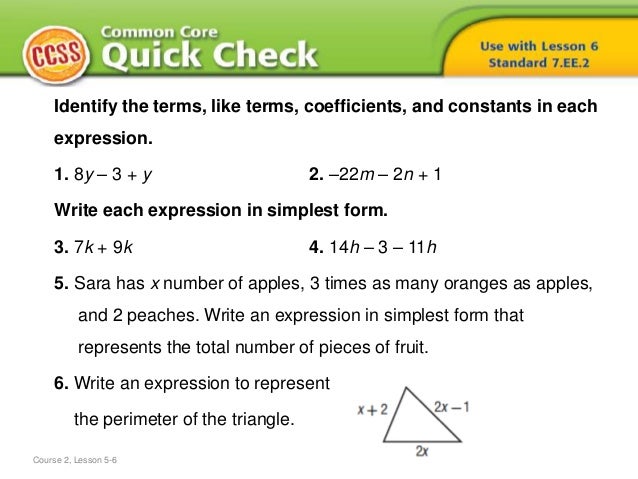



7 Lesson 5 6 Simplify Algebraic Expressions
By plugging in ( n − 2)!Until the expression ( n − 2)!Why create a profile on Shaalaacom?




Simplifying Algebraic Expressions By Brett Berry Math Hacks Medium




2 N 1 Simplify Novocom Top
5 Q5 1 pt Simplify 2 n 2 n δ n 1 δ n 1a 2 n 1b 2 n c 2 n d 2 e 0 5 f 1 2 δ n 1 from EECS 50 at University of California, Irvine This preview shows page 5 12 out of 23 pagesThe quadratic formula gives two solutions, one when ± is addition and one when it is subtraction 9n^ {2}7n4=0 9 n 2 − 7 n − 4 = 0 This equation is in standard form ax^ {2}bxc=0 Substitute 9 for a, 7 for b, and 4 for c in the quadratic formula, \frac {b±\sqrt {b^ {2}4ac}} {2a}1 Inform you about time table of exam 2 Inform you about new question papers 3 New video tutorials information



Solved Simplify Show All Your Steps 9 6 5 4 3 2 8 Solve The Equation For N Show All Of Your Steps Then Verify Your Answer A N Course Hero




16x2n 1 4x2n 16x2n 1 2x2n 2x2n 2 Simplify The Given Sum Maths Exponents And Powers Meritnation Com
Simplify 16 * 2 ^ n 1 4 * 2 ^ n / 16 * 2 ^ n 2 2 *2 ^ n 2Polynomial Roots Calculator 51 Find roots (zeroes) of F (n) = 6n5 6n4 9n2 n 1 Polynomial Roots Calculator is a set of methods aimed at finding values of n for which F (n)=0 Rational Roots Test is one of the above mentioned tools It would only find Rational Roots that is numbers n which can be expressed as the quotient of two43 Factoring 3n2 11n 10 The first term is, 3n2 its coefficient is 3 The middle term is, 11n its coefficient is 11 The last term, "the constant", is 10 Step1 Multiply the coefficient of the first term by the constant 3 • 10 = 30 Step2 Find two factors of 30 whose sum equals the coefficient of the middle term, which is 11




Double Factorial Wikipedia



2 N 1 Simplify Novocom Top
Simplify\\frac{x^214x49}{49x^2} simplify\\frac{6}{x1}\frac{3}{x1} simplify\\frac{5x}{6}\frac{3x}{2} simplifycalculator en Related Symbolab blog posts Middle School Math Solutions – Equation Calculator Welcome to our new "Getting Started" math solutions series Over the next few weeks, we'll be showing how SymbolabMaharashtra State Board HSC Science (General) 11th Textbook Solutions 8028 Important Solutions 18 Question Bank Solutions 5539 Concept Notes & Videos 397 Syllabus Advertisement RemoveExamples of Simplifying Factorials with Variables Example 1 Simplify Since the factorial expression in the numerator is larger than the denominator, I can partially expand n!




Sum Of N N Or N Brilliant Math Science Wiki




For Help Go To Lessons 1 2 And 1 7 Algebra 1 Lesson 2 3 Simplify Each Expression 1 2n 3n2 4 3b B 3 9 W 5 4 10 B 12 5 3 X 4 6 5 6 Ppt Download
We can write it as n ⋅ (n −1)(n − 2)(n − 3)!Summation Overview The summation (\(\sum\)) is a way of concisely expressing the sum of a series of related values For example, suppose we wanted a concise way of writing \(1 21/2,1/2^2,1/2^(n1) the common ratio of the GP is 1/2(r) the first term is 1/2



How To Prove That Math Frac 2 N 2 N 1 2 N 1 2 N 3 2 Quora



Simplify 16 X 2 N 1 4 X 2 N 16 X 2 N 2 2 X 2 N 2 Sarthaks Econnect Largest Online Education Community
I need help with Choose Math Help Item Calculus, Derivatives Calculus, Integration CalculusFor a the answer is 5 and 5 since ( 5) 2 = 25 and ( 5) 2 = 25 For b the answer is 5 since the radical sign represents the principal or positive square root Whole numbers such as 16, 25, 36, and so on, whose square roots are integers, are called perfect square numbers For the present time we are interested only in square roots ofAnswer to 4 Simplify (1 mark each) a n!




Simplify N 3 N 2 N 1 N 3 N 1 2 And State The Excluded Values Youtube



Simplify I n 3 A 2n 1 N 2 A3 2n 1 An 2n 1 Studyrankersonline
18 hours ago simplify $\sum_{k=2}^{n1} k\log k$ with the hint that is to split the summation into two parts Ask Question Asked today Active today Viewed 10 times 0 $\begingroup$ Show that $$\sum_{k=2}^{n1} k\log k\leq \frac12n^2\log n\frac18n^2$$ Hint Split the summationThis calculator can be used to expand and simplify any polynomial expressionSimplify Calculator Step 1 Enter the expression you want to simplify into the editor The simplification calculator allows you to take a simple or complex expression and simplify and reduce the expression to it's simplest form The calculator works for both numbers and expressions containing variables Step 2




Simplifying Big O Notation Stack Overflow



How To Prove That Math Frac 2 N 2 N 1 2 N 1 2 N 3 2 Quora
Square root simplification calculator algebra numbers Derive a Java program that Solve a quadratic equation of the type Ask the user to enter the values of a, b and c and then print out the values of x) Note You can calculate the values by using the quadratic formula and using methods of Math class from Java APIHere we will simplify 2/1 to its simplest form and convert it to a mixed number if necessary In the fraction 2/1, 2 is the numerator and 1 is the denominator When you ask "What is 2/1 simplified?", we assume you want to know how to simplify the numerator and denominator to their smallest values, while still keeping the same value of the fractionAnd so n ⋅ (n −1)(n − 2) (n − 3)!




Simplify Each Of The Following A 7 N 3 Xx 7 N 1 Xx




How To Simplify This Composition Function G X Underset N Text Times Underbrace F Circ F Circ F Circ F Circ F Circ Cdots Circ F X Mathematics Stack Exchange
(n – 1)! n2(n – 1)!2 2 times the sum of the first n n n integers, so putting this all together gives 2 n ( 2 n 1) 2 − 2 ( n ( n 1) 2) = n ( 2 n 1) − n ( n 1) = n 2 \frac {2n (2n1)}2 2\left ( \frac {n (n1)}2 \right) = n (2n1)n (n1) = n^2 22n(2n1) −2( 2n(n1) ) = n(2n1)− n(n 1) = n2Simplify (x^2yy^x/x^yy^3x)^3 Simplify (2^n1 2^n/2^n 2^n1)^3 Simplify x^2n x^n 2/x^2n 3x^n 1 Simplify x^2n y^2n/x^n y^n Get more help from Chegg Solve it with our algebra problem solver and calculator
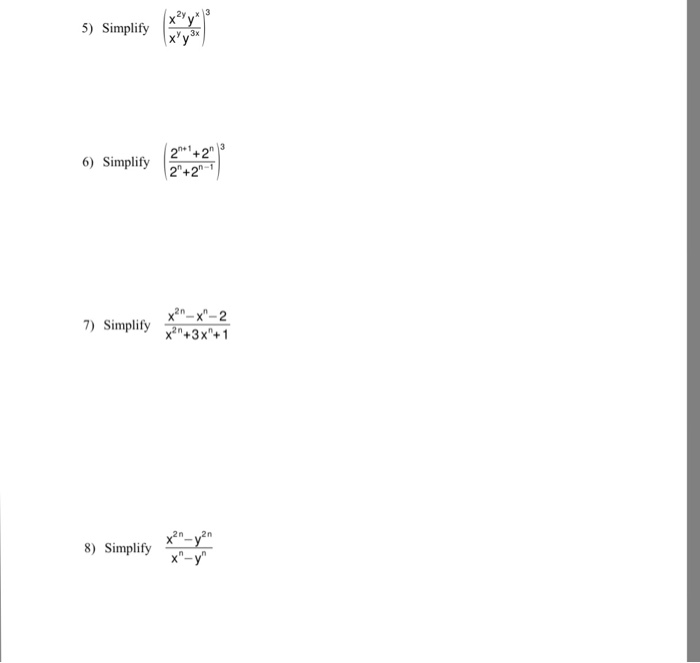



Simplify X 2yy X X Yy 3x 3 Simplify 2 N 1 Chegg Com




Simplify The Following I 5 N 3 6 Xx 5 N 1 9 Xx 5
See the answer See the answer See the answer done loadingSimplify any Algebraic Expression If you have some tough algebraic expression to simplify, this page will try everything this web site knows to simplify it No promises, but, the site will try everything it has Type your problem here Quick!= ( n − 2)!




10 Simplify N 3 I 2n 2 Ii 2 4 N




Question 3 Simplify The Factorial Expression N Chegg Com
Simplify 16 x 2n1 4 x 2n/ 16 x 2n2 2 x 2n2 I couldn't understand the second last part can please anyone help me asapSolution (By Examveda Team) 2 n − 1 2 n 1 = 3 ⇒ 2 n − 1 ( 1 2 2) = 3 ⇒ 2 n − 1 × 5 = 3 ⇒ 2 n − 1 = 3 5 = 64 ⇒ ( 2) n − 1 = ( 2) 6 ⇒ n − 1 = 6 ⇒ n = 7= n(n − 1)!




Simplify 3 9 N 1 9 3 2n 3 3 2n 3 9n 1 Brainly In




How Do You Simplify N 1 N 2 Socratic
N ( n − 1)!To simplify your expression using the Simplify Calculator, type in your expression like 2(5x4)3x The simplify calculator will then show you the steps to help you learn how to simplify your algebraic expression on your own Typing Exponents Type ^ for exponents like x^2 for "x squared" Here is an exampleI get it to this 2 n (n1)2 n (n1) = 2 n * n 2 n 2 n * n 2 n = 2 n * n 2 n * n = ???




How To Prove That Math Frac 2 N 2 N 1 2 N 1 2 N 3 2 Quora




N 3 N 2 4 N 1 Simplify Brainly In
(n − 2) (n − 3)!In this lesson I will show you how to simplify factorial expressions through the example ((n2)!n!)/(n1)!= ( n − 2) ⋯ ( 2) ( 1) into the expression for ( n − 1)!



1
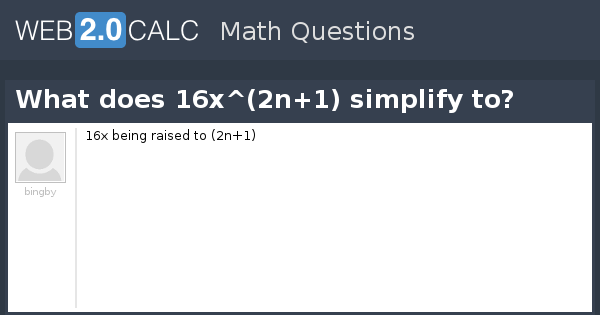



View Question What Does 16x 2n 1 Simplify To
(n − 2)(n −3)!= ( n − 1)!(If you graph 4x and 2 x on the same axes, you'll see why we have to start at n = 5, instead of the customary n = 1) Let n = 5 Then 4 n = 4×5 = , and 2 n = 2 5 = 32
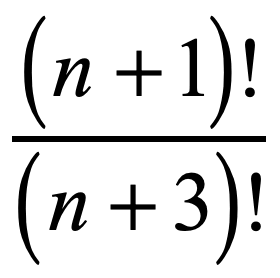



Simplifying Factorials With Variables Chilimath




Simplify N 4 N 2 N N 1 N 2 N Youtube
Simplify (2^ (n1))/ ( (2^n)^ (n1)) 2n1 (2n)n−1 2 n 1 ( 2 n) n 1 Reduce the expression by cancelling the common factors Tap for more steps Multiply the exponents in ( 2 n) n − 1 ( 2 n) n 1 Tap for more steps Apply the power rule and multiply exponents, ( a m) n= where you used the fact that n!QuickMath will automatically answer the most common problems in algebra, equations and calculus faced by highschool and college students The algebra section allows you to expand, factor or simplify virtually any expression you choose It also has commands for splitting fractions into partial fractions, combining several fractions into one and



1




When Simplified The Sum 1 2 1 6 1 12 1 1 30 Ddot 1 N N 1 Is Equal To Youtube
Hint Let f(x)=\sum_{n=1}^\infty\frac{a_n}{n}x^n Then, formally, f'(x)=\sum_{n=1}^\infty a_nx^{n1} Now, consider 2xf(x)x^2f'(x) 2xf(x)x^2f'(x)=2x\sum_{n=1}^\infty\frac{a_n}{n}x^nx^2\sum_{n=1}^\infty a_nx^{n1}=\sum_{n=1}^\infty \left(\frac{2a_n}{n}a_n\right)x^{n1}In the fraction 2/25, 2 is the numerator and 25 is the denominator When you ask "What is 2/25 simplified?", we assume you want to know how to simplify the numerator and denominator to their smallest values, while still keeping the same value of the fraction We do this by first finding the greatest common factor of 2 and 25, which is 1= ( n − 1) ( n − 2) ⋯ ( 2) ( 1) = ( n − 1) ( n − 2)!




Simplify Rational Expressions




2 Simplify A Cn N B Cn N 1 Gauthmath
k = (n 1)H n n 2Let n = P n k=0 k 2 When we expand this out into two sums, switch the sums, and simplify, we get back n = '=1 n 1 2 ' 2 = 2n3 3n2 n 4 1 2 '=1 '2 We don't yet know how to simplify the last sum, but since it is just 1 2 n, we can solve the equation for n to get n = n(n 1)(2n 1) 6




If X 2 2 Then Find X2 Simplify 3 X 2n 4 2n 2 2n Math




Simplify The Expression 6 N 2 N 1 Brainly Com




Simplify 2 N 2 N 1 2 N 1 2 N Brainly In




Simplifying Factorials With Variables Chilimath Algebra Lessons Math Videos Quadratics




2 Simplify N 2 1 N 2n 1 2 2n 1 2n 2 3 Homeworklib




For Help Go To Lessons 1 2 And 1 7 Algebra 1 Lesson 2 3 Simplify Each Expression 1 2n 3n2 4 3b B 3 9 W 5 4 10 B 12 5 3 X 4 6 5 6 Ppt Download




1 Simplify N 3 N 1 A 122 2 B 1 N2 3n 2 Chegg Com




College Prep Algebra
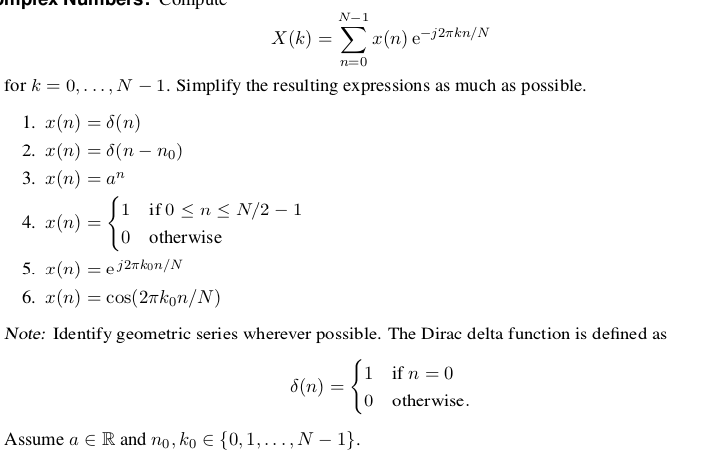



N 1 For K 0 N 1 Simplify The Resulting Chegg Com
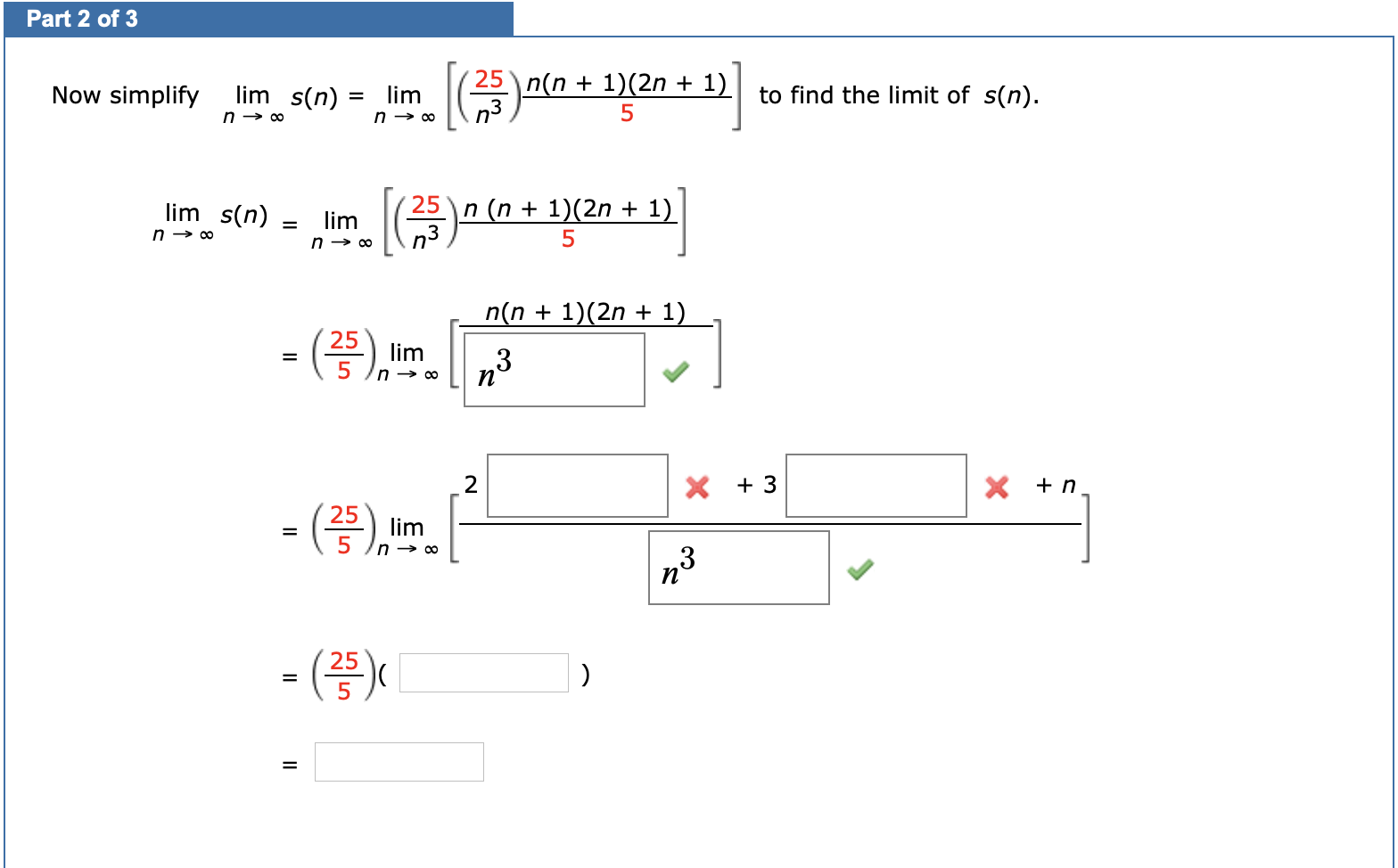



Answered Now Simplify Lim S N Lim N 0 25 N N Bartleby
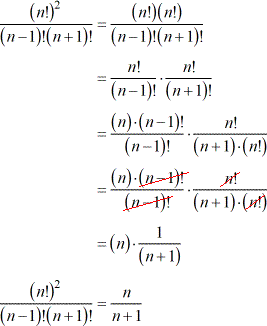



Simplifying Factorials With Variables Chilimath




Simplify The Following I 5 N 3 6 Xx 5 N 1 9 Xx 5




16 Simplify Dfrac16times2n1 4 See How To Solve It At Qanda




4 Simplify 16 X 2n 1 I Scholr
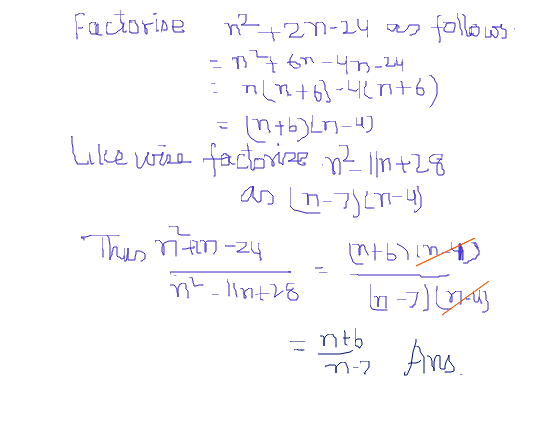



How Do You Simplify N 2 2n 24 N 2 11n 28 Socratic




Simplify Each Of The Following A 7 N 3 Xx 7 N 1 Xx




A Simplifying Expressions Wit See How To Solve It At Qanda



Visualizing Expressions With The Border Problem Gateway School K 8 Independent School In Santa Cruz Ca
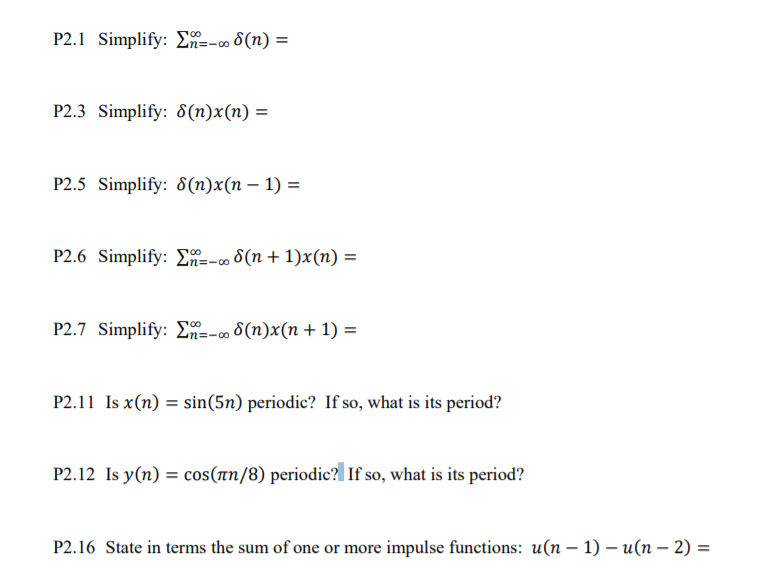



P2 1 Simplify Sa A D N P2 3 Simplify D N X N Chegg Com
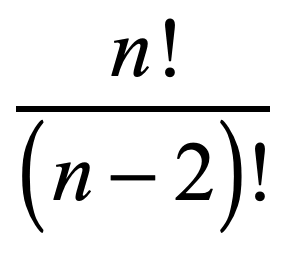



Simplifying Factorials With Variables Chilimath
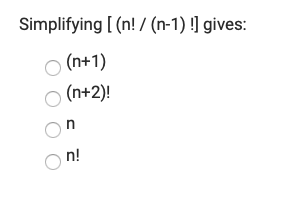



Answered Simplifying N N 1 Gives O Bartleby




How To Simplify Factorial Expressions Youtube
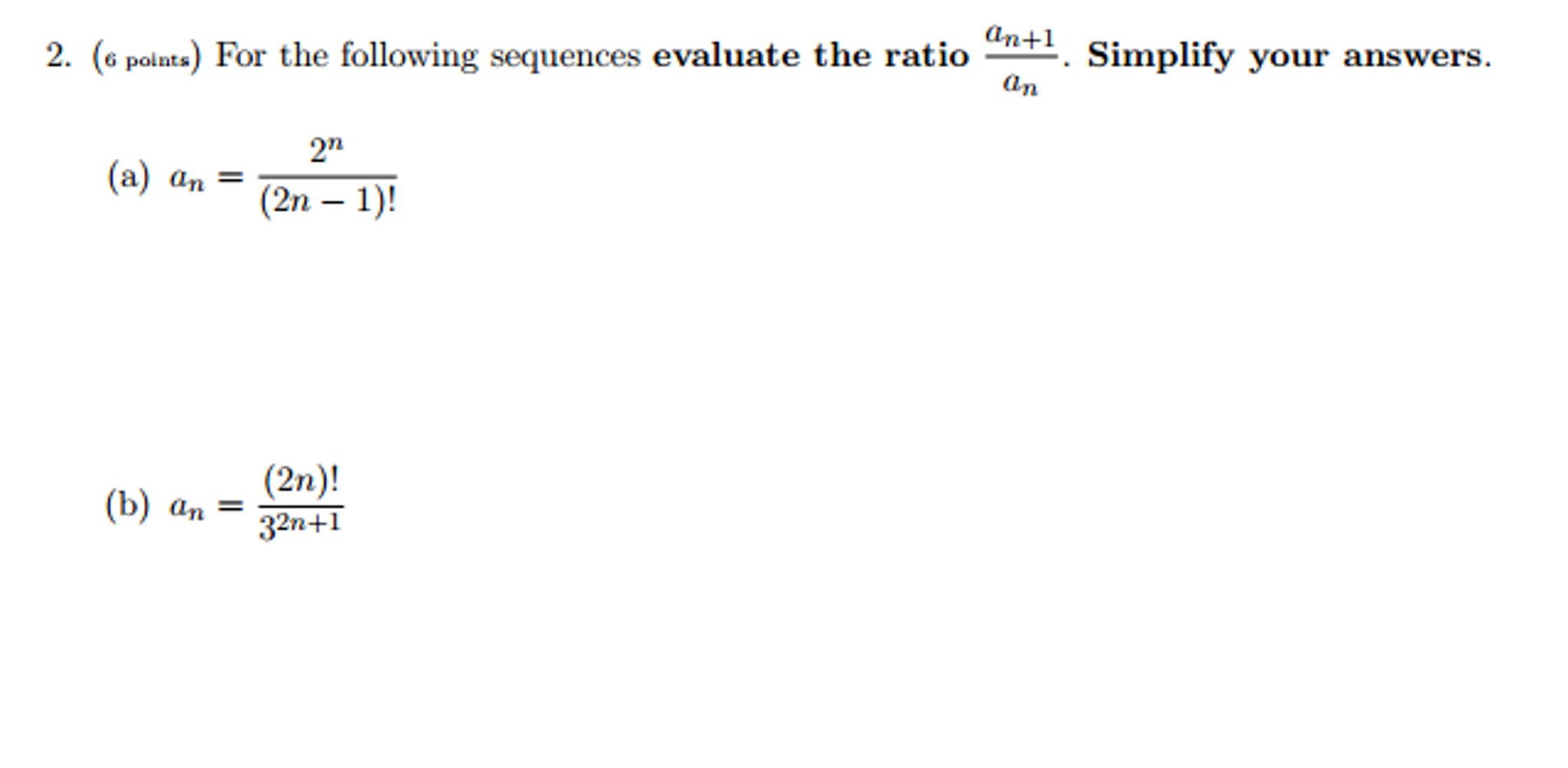



For The Following Sequences Evaluate The Ratio A N Chegg Com




Multiplying Out Brackets Factorization Mathematical Analysis
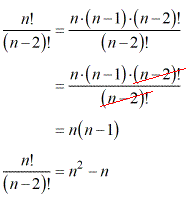



Simplifying Factorials With Variables Chilimath
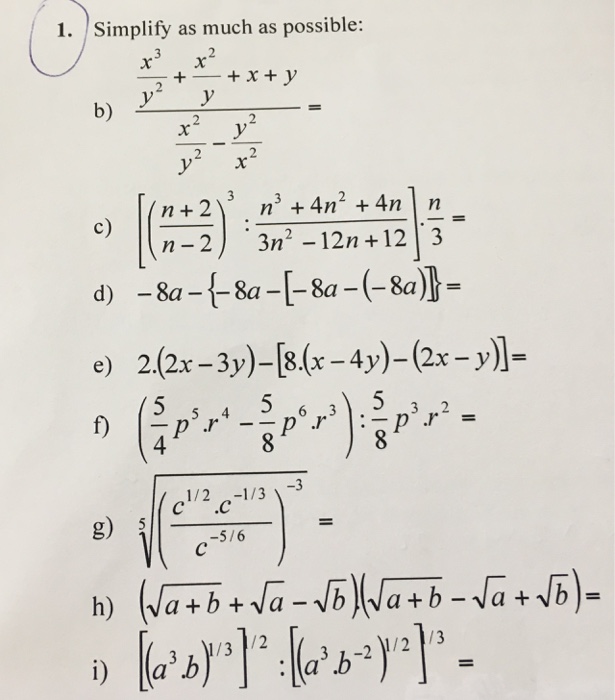



Simplify As Much As Possible X 3 Y 2 X 2 Y X Chegg Com




Warm Up Simplify Using Only Positive Exponents 1 7n 2 3n 5 2 4y 6 3 Solve For The Value Of X Ppt Download




Solved Simplify 16 2n 1 4 2n16 2n1 2n 2 2 2n 1 The Given Expr Self Study 365




Simplify Left Frac X 3 N 1 X 3 N 1 X 2 N 1 Right Scholr




2 Simplify A Cn N B Cn N 1 Gauthmath



Warm Up 1 Simplify The Formula A 5




How To Simplify This Composition Function G X Underset N Text Times Underbrace F Circ F Circ F Circ F Circ F Circ Cdots Circ F X Mathematics Stack Exchange
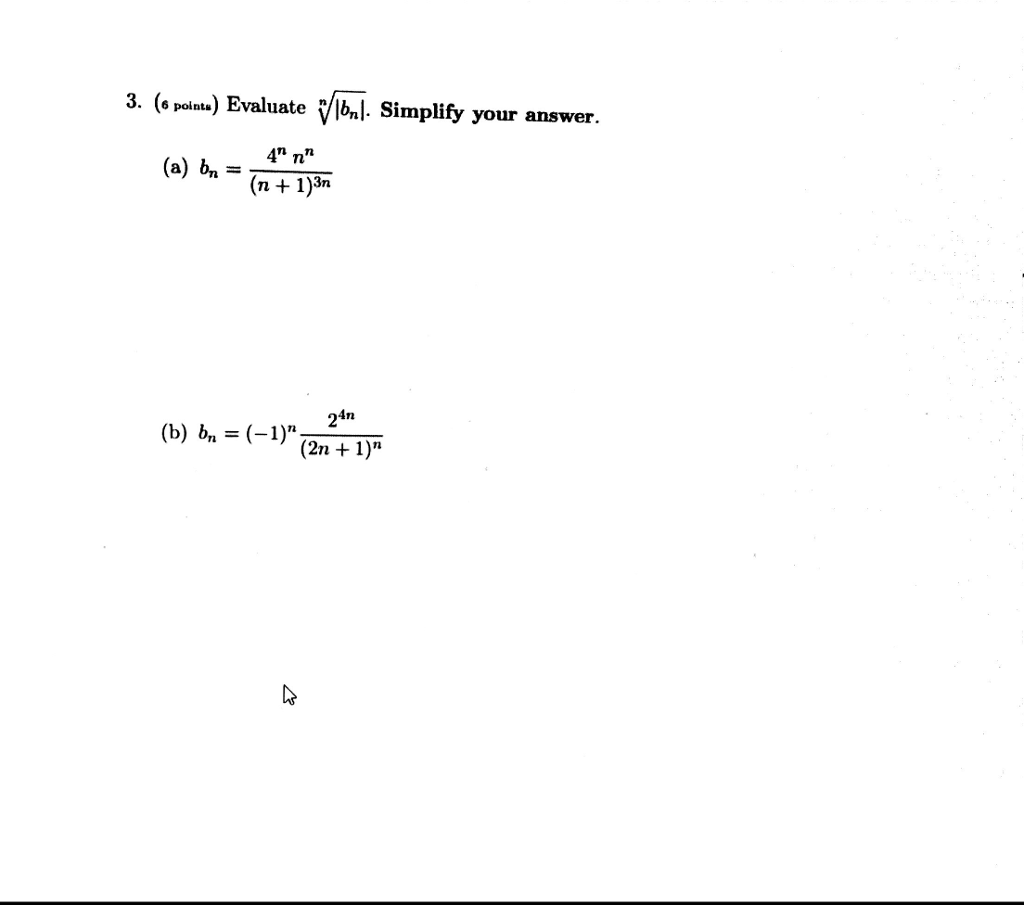



Evaluate N Squareroot B N Simplify Your Answer Chegg Com
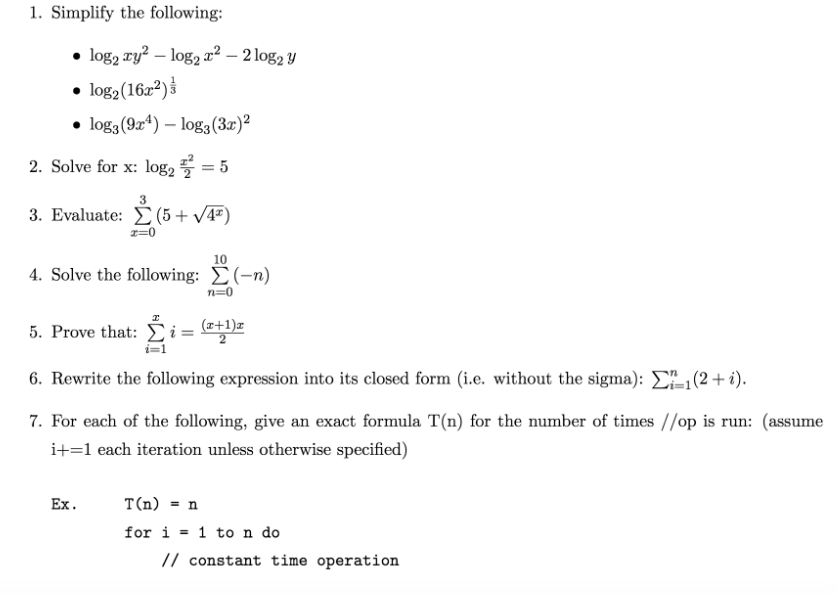



Solved 1 Simplify Following Log2 Ry2 Log2 2 2 Log2 Log2 16z2 Log3 9z4 Log3 3 2 O Y 2 Solve X Lo Q




2n 2 2n 1 2n 3 5 3 1 E 10 Simplify N 3
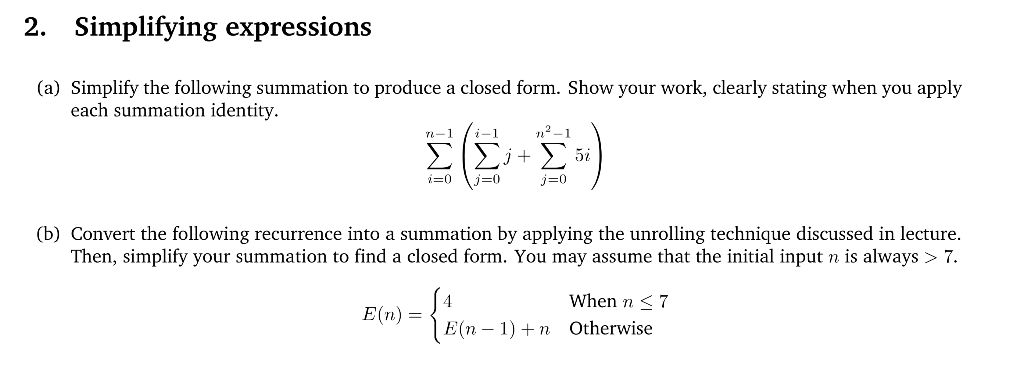



Solved 2 Simplifying Expressions Simplify Following Summation Produce Closed Form Show Work Clear Q



How To Prove That Math Frac 2 N 2 N 1 2 N 1 2 N 3 2 Quora




Simplify 2 N 2 N 1 2 N 1 2 N Brainly In
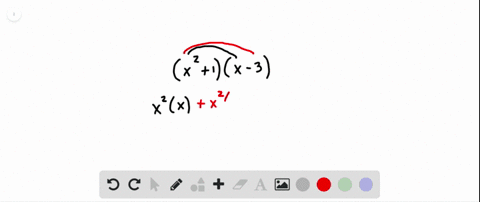



Solved Simplify Each Product Write In Standard F



Classroom Intermediate Algebra Intermediate Algebra Simplifying Expressions With Factorials Problem 2 Video Math Teacher




What Is The Simplified Form Of 3 N 2 3 N 3 3 N 1 Quora




Simplify To Create An Equivalent Expression 3n 2 2n 1 3n 2




How To Simplify Math Dfrac 2 N 1 2 N 2 Cdots 2 2 N Math Quora
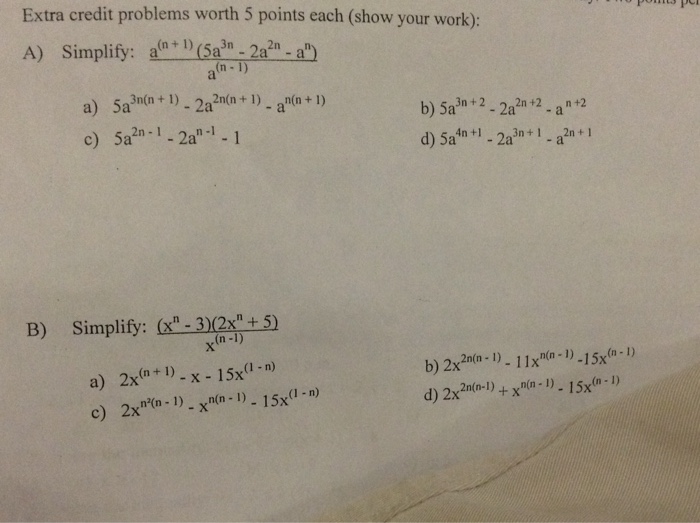



A Simplify A N 1 5a 3n 2a 2n A N A N Chegg Com



Http Calclab Math Tamu Edu Python Math152lab6b Pdf




Simplify 2 N 4 5 Times 2 N 1 6 Times 2 N 2 N 1 Times 3
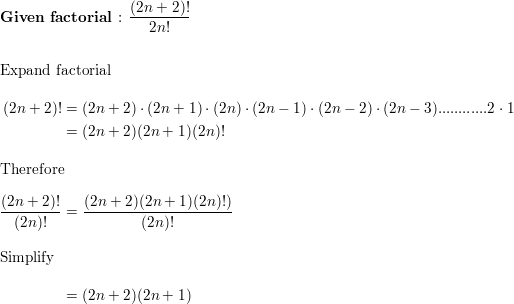



Simplify The Ratio Of Factorials 2n 2 2n Homework Help And Answers Slader
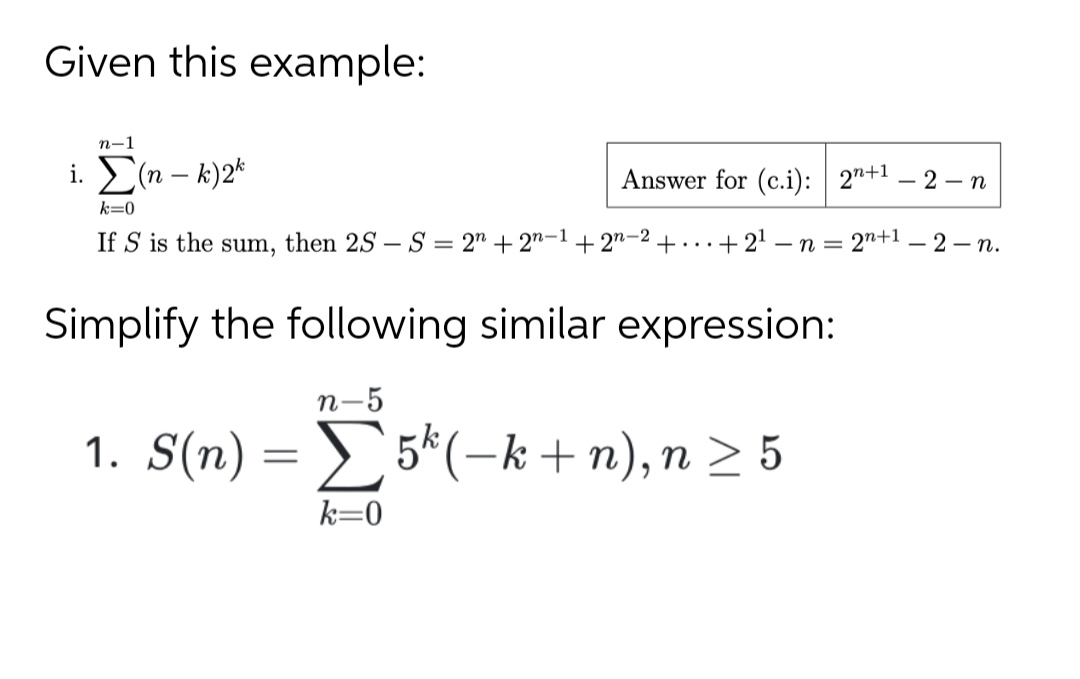



Answered Given This Example N 1 I E N K 2 Bartleby




Simplify Expressions With Polygamma Special Function And Complex Number Mathematica Stack Exchange




Warm Up 1 Simplify The Formula A 5




Simplify 16 Into 2 To The Power N 1 4 To The Power 2n Upon 16 Into 2 To The Power N 2 2 Into 2 Brainly In



Simplify And Hence Find The Value Of N 3 2n 9 2 3 N 3 3n 27 Sarthaks Econnect Largest Online Education Community




Simplify Each Of The Following Expressions Then D Gauthmath



Solved Simplify Show All Your Steps 9 6 5 4 3 2 8 Solve The Equation For N Show All Of Your Steps Then Verify Your Answer A N Course Hero




Equilibrium Structures Of Hydrocyanofullerenes C 60 H Cn 2n 1 N 1 Download Scientific Diagram
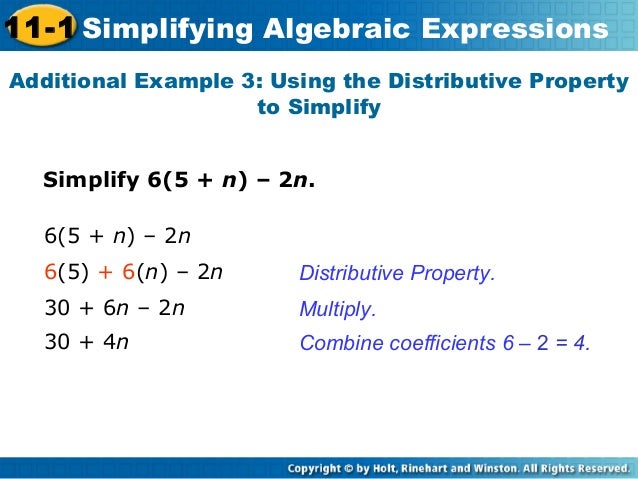



Holt Simplifying Algebraic Expressions Review
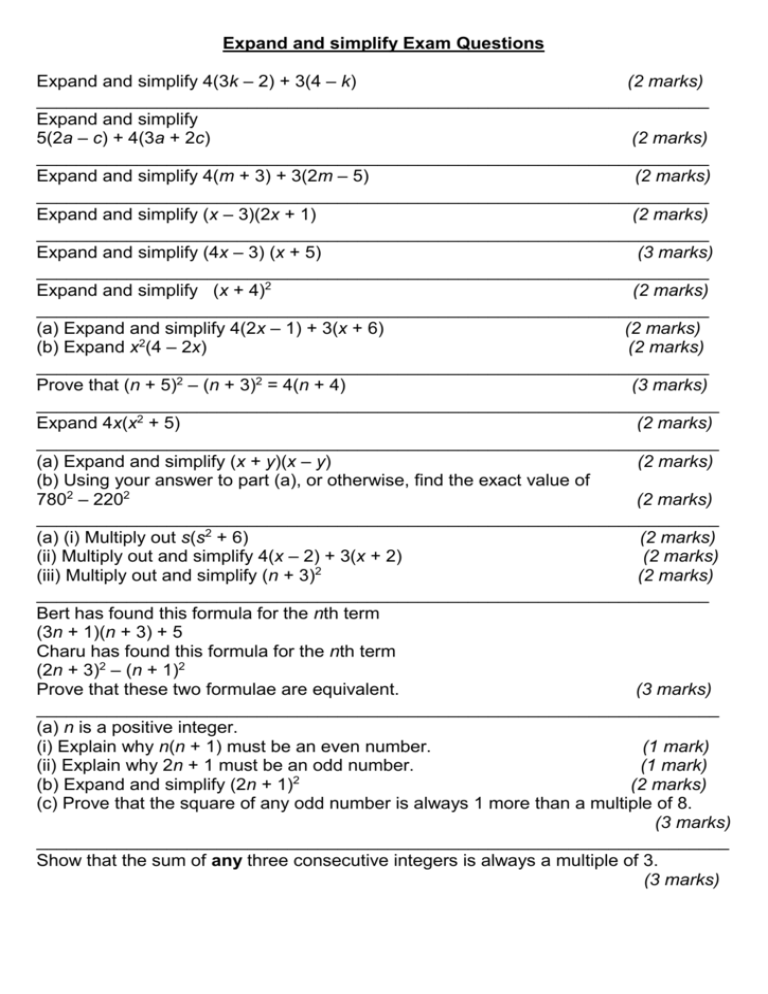



Expand And Simplify Exam Questions




Simplify 16 2 N 1 4 2 N 16 2 N 2 2 2 N 2 Socratic




Simplify 16 2 N 1 4 2 N16 2 N 2 2 2 N 2
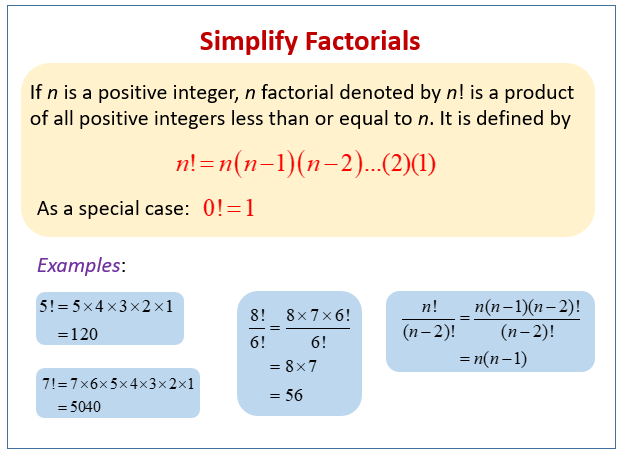



Simplify Factorial Examples Videos Worksheets Solutions Activities



0 件のコメント:
コメントを投稿